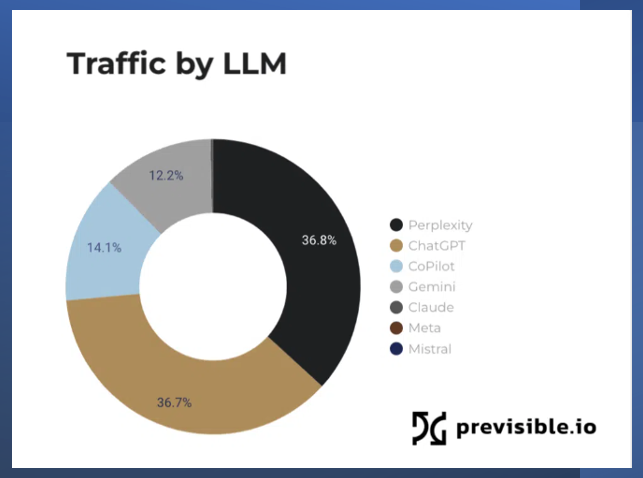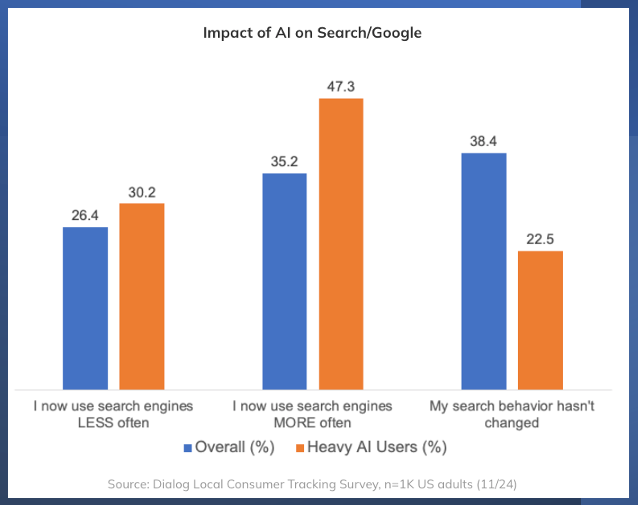Xmas Eve Edition: Google AI Mode, Antitrust Lite, AI Users Search More, LLM Referrals
Happy Holidays to all and thanks for your continued support!

Google's Coming 'AI Mode'
Earlier this week The Information first reported that Google was going to introduce an "AI Mode" to its mobile search experience. If accurate, it signals a deeper integration of Gemini capabilities in search but not necessarily the SERP. It appears to be launching on mobile but would likely come to the desktop. It also appears to be a variation on Google's current mobile Search-Gemini toggle, which has been around for some time (usage is unclear). While AI Overviews continue to roll out for more categories and queries, they don't compete with the experience offered by ChatGPT, Claude, Perplexity and even Gemini's native capabilities. Presumably AI Mode will allow users to get more context and ask follow up questions – without having to enter a new query – which currently can't be done in the traditional SERP. This UX would be more directly competitive with ChatGPT and provide users with some of the things they value about the AI experience: conversational interaction, follow-up questions, more complete information. Depending on how it's executed it could be a very clever and effective way for the company to provide two complementary experiences and retain users.

Our take:
- Search is getting an AI makeover in multiple ways. For example, this week the company introduced AI Organized pages for restaurants and bars.
- AI Overviews offer a tepid AI user experience; AI Mode would allow for something more useful and "robust."
- This "side-by-side" experience would potentially give Google something its competitors don't have (AI + Knowledge Graphs + Search).
Google to Court: Don't Break Us Up
Google filed its response to the US Department of Justice's (DOJ) proposed remedies in its antitrust case. The DOJ has proposed significant penalties and remedies, including selling Google’s Chrome browser (and potentially Android), syndicating search data for 10 years, killing default search deals and imposing multiple restrictions around AI distribution. Google's proposal, as you might expect, seeks to avoid almost all of what the DOJ wants. Google recommends ending exclusive search distribution agreements but still allowing non-exclusive default search arrangements. Google also says it will no longer require Android device manufacturers to license Google search or Chrome or preload Google apps. It also said that it won't force device makers to license and distribute Gemini or seek to prevent rival chatbots on Android phones. The DOJ had asked for licensing/sharing of Google's search data to rivals for 10 years. Google countered with a suggestion of three years. The district court will hear both sets of recommendations and arguments in April 2025. Google continues to maintain it's not a monopoly and is going to appeal the court's liability ruling.

Our take:
- Apple is seeking to intervene in the case so it can try to hang on to Google's billions in default search payments.
- Google's proposal seeks to minimize the impact of potential remedies on its core businesses without sacrificing all credibility. It almost gets there.
- The court will likely adopt some of each side's recommendations. The big question is whether what comes out will have any real impact.
Study: AI Sites Starting to Drive Traffic
Previsible conducted a small LLM Traffic Study to determine how much traffic was coming from LLMs and specifically which AI sites (h/t SEJ). Previsible looked at 30 sites in different categories and tracked referrals from Perplexity, ChatGPT, CoPilot, Gemini, Claude, Meta and Mistral. The study found that "Perplexity and ChatGPT are neck-and-neck, each commanding about 37% of LLM referral traffic." CoPilot and Gemini each drove about 12% - 14%. Others (Claude, Meta, Mistral) had a minimal impact. A range of site categories were among the dataset: Finance, SaaS, Health, Legal, Insurance, E-commerce and others. However, "84% of all LLM referral traffic [ ] analyzed went to finance-related websites." Here Perplexity was the winner. Otherwise ChatGPT was the largest referrer. What types of content/pages are being linked to? Previsible found it was blog posts (77.4%), homepages (9%), news content (8.2%) and guides (2.4%). It also said that AI referral traffic had grown by triple digits in just a few months. Previsible predicted, "If current growth rates hold, what’s currently 0.25% of total traffic from LLMs could become 10% of the overall traffic mix by the end of 2025."

Our take:
- The study was small. But it suggests that LLM referrals may be uneven and category dependent (at least for the immediate future).
- Specific LLMs may wind up having greater influence in specific verticals, as Perplexity did with finance in this study.
- Recommendations: high quality (informational) content, blog-to-conversion paths, SEO best practices and build brand authority.
Surprise: Heavy AI Users Search More
One of the great surprises of a recent Dialog consumer study is the finding that many heavy AI users actually use search more not less. This is contrary to what I expected and it appears to support what Google is doing with AI Mode. Previously, based on my own behavior and some empirical data, I assumed AI would increasingly cannibalize Google. There's some evidence of this. But for many, search and AI are complementary rather than mutually exclusive. The survey of 1K US adults recruited people who used search engines at least weekly and had previously used AI at least once. There are lots of interesting findings in the data but I want to highlight just a couple now: 57% of respondents said they used AI daily; 28% reported multiple times a day. I would expect this latter group to report reduced Google usage – that was true for 26% of total respondents – but nearly 50% of "heavy AI users" said they used Google more. When asked, "Are AI applications and search engines basically interchangeable or are they different?" 95% of these users said "they're different and I use them differently." This implies that more sophisticated AI users see different use cases for search and AI.

Our take:
- Although this is my survey, I'll say it again: we need to be careful about generalizing too much from one survey. But it's provocative.
- There's no question that Google will lose some amount of informational query volume to ChatGPT and others. Hence AI Mode.
- It's clear that Google and its Knowledge Graphs (especially local) can deliver things AI is currently unable to (but for how long)?
Recent Analysis
- First Look: AI-Organized Restaurant Results, by Mike Blumenthal.
- Near Memo episode 187: Exploring Google’s DMA Compliance & User Search Behavior with Siinda’s Stephanie Verilhac.
Short Takes
LOCAL
- Big local boost: ChatGPT taps Foursquare's 100M places API.
- Recently viewed places: personalized local SERPs.
- Visa: 77% of holiday shopping payment volume in store versus 23% online.
- Local biz: coping with the stress and frustrations of dealing with Google.
GENERAL SEARCH & SEO
- Google pitches the benefits of Chrome autofill to merchants.
- Google tests two ad placements for one advertiser in same local result.
- Google showing payment options on some retailer Knowledge Panels.
AI
- Google made more than 60 AI announcements this year.
- Microsoft Copilot and Gemini among top 20 fastest growing brands.
- Google using Anthropic's Claude to benchmark performance.
- Google Gemini can now answer questions about PDFs.
- Google AIOs muscling in on coupon sites.
- AI crawlers (other than Google) don't render JavaScript.
LAW & POLICY
- AI-generated fake reviews continue to increase online.
- Google argues EU DMA "test removal" of hotel features created a bad UX.
- FTC: AutoCanada to pay $20 million re fraud claims (junk fees, fake reviews).
OVERFLOW
- Musk has raised $6 billion for xAI, his AI company.
- AI progress will accelerate in 2025 and be faster than in 2024.
Listen to our latest podcast.

How can we make this better? Email us with suggestions and recommendations.

